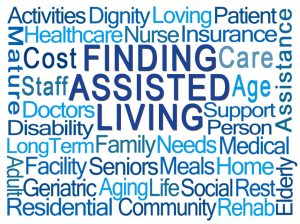 This subject may seem confusing because regulation of assisted living facilities is a state responsibility and there is not a uniform definition that applies everywhere. Some states do not even use the term, ‘assisted living facilities’. Adding to the confusion is the fact that within each state bureaucracy, there are numerous definitions of senior care, care homes, assisted living homes or assisted living facilities. Commonly, the different terms refer to varying levels of care that a senior care or assisted living facility is licensed to provide.
This subject may seem confusing because regulation of assisted living facilities is a state responsibility and there is not a uniform definition that applies everywhere. Some states do not even use the term, ‘assisted living facilities’. Adding to the confusion is the fact that within each state bureaucracy, there are numerous definitions of senior care, care homes, assisted living homes or assisted living facilities. Commonly, the different terms refer to varying levels of care that a senior care or assisted living facility is licensed to provide.
It is important to understand that the terms, ‘assisted living homes’ and ‘assisted living facilities’ refer to a particular type of senior housing. Other categories of senior housing include forms like senior apartments, retirement communities, senior living communities and independent senior living villages. A separate article on the FindingAssistedLiving.com website will explain these other senior housing options.
Right now, let’s discuss the types of assisted living facilities in the state of Florida. Florida is a good example for many reasons, as it is the home of a large number of seniors. Like other states, Florida has established a government agency to regulate, oversee and license assisted living facilities. This organization, the Agency for Health Care Administration (AHCA), defines and licenses four separate types of assisted living facilities as below:
- Standard – All assisted living facilities operating in Florida must hold a standard ALF license. This license will state the maximum capacity of the assisted living facility, the type of care for which the license is granted and an expiration date. This allows the operator to function as an assisted living facility, providing housing, meals, and personal services to one or more adults.
- Extended Congregate Care (ECC) – The purpose of the ECC license is to allow the residents of assisted living facilities to ‘age in place’ as they begin to require more services than are provided by a standard ALF. These services might include things like total help with bathing and dressing, rehab services following illness or injury, limited nursing services and providing escort to and from medical appointments. If you or your loved one is likely to require more and more assistance with daily activities, it is wise to look for a senior care facility that holds an ECC license. When the extra services are needed, it will not be necessary to uproot the assisted living resident and move them to a new environment.
- Limited Nursing Services (LNS) license – an LNS license enables the assisted living facility to provide certain nursing services beyond those allowed by the standard or ECC licenses. These limited services may include things like the administration of portable oxygen, catheter, colostomy, ileostomy care and maintenance and other specific medical services. When a resident of an assisted living facility needs one of these services, it will not be necessary to move them to a different senior care provider. This follows the ‘age in place’ philosophy, allowing residents to remain in familiar surroundings even as they require more and more caregiver services.
- Limited Mental Health (LMH) license – This is a special license that enables the assisted living facility to care for residents who have mental health care requirements. In a senior care facility with a LMH license, residents with behavioral health issues will have a community living support plan; the facility will establish a cooperative agreement between the assisted living facility and the mental health provider. If your loved one is having behavioral issues, sometimes seen with dementia or Alzheimer’s disease, you should seek an assisted living facility that holds a LMH license.
If all of this seems too complicated or just plain overwhelming, you are not alone. Any transition to a senior lifestyle involves numerous challenges and choices. The assisted living facility is only one of many senior housing options. It may be the right choice for you or your family member, but retirement communities, senior living communities, senior apartments and other options should also be considered.
Finding Assisted Living and FindingAssistedLiving.com exist to help you make these choices. It is our aim to make every person’s transition to senior living as safe, secure and satisfying as possible. Our staff is familiar with the local providers of senior care and assisted living facilities. We can answer the question, “What are the best assisted living facilities near me?” When you need trustworthy and unbiased advice about these or any other senior living questions, please call on us.
Please contact FindingAssistedLiving.com or call 866-333-2657.
